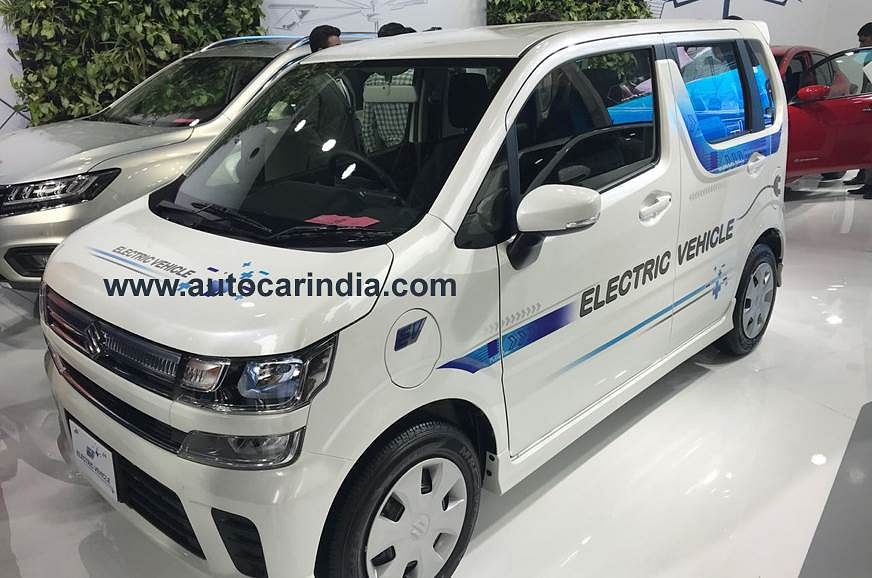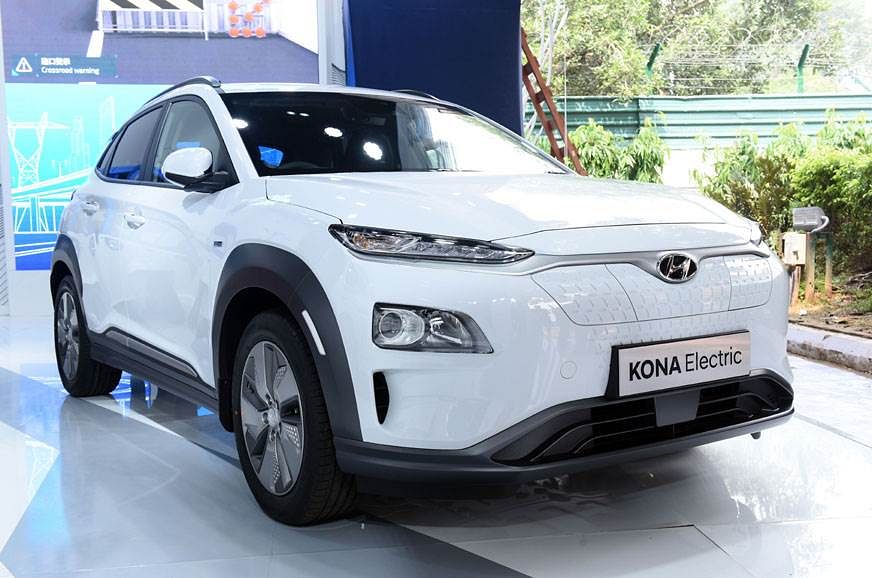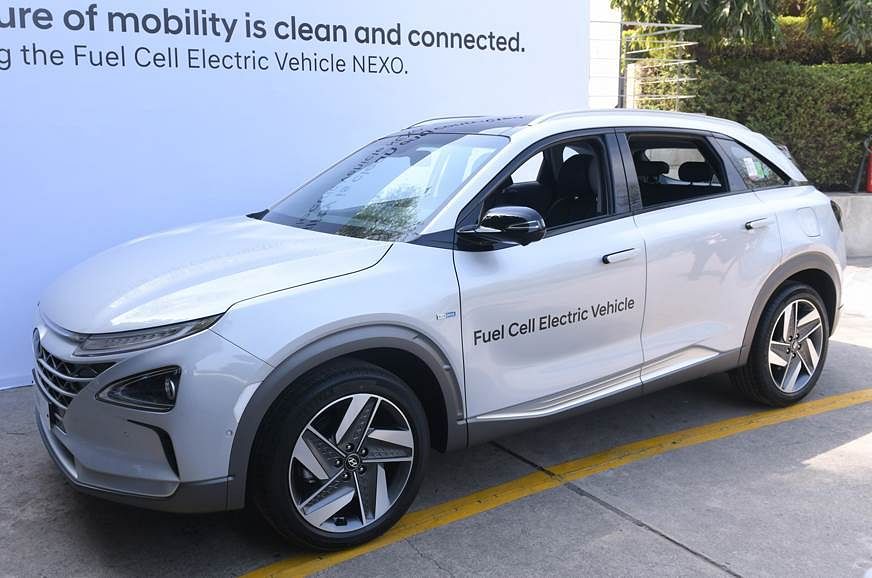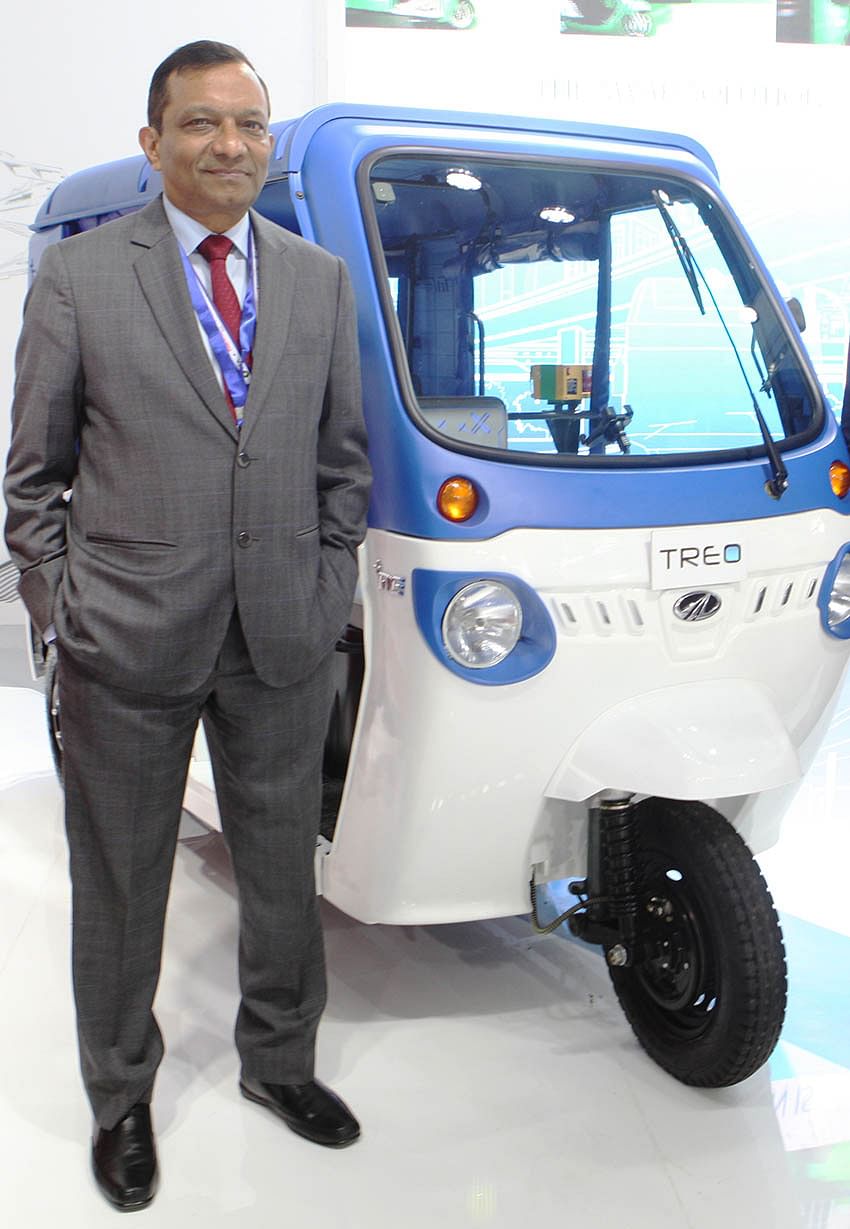Maruti, Hyundai, Mahindra showcase EVs at MOVE Mobility Summit
While Maruti Suzuki India revealed a prototype EV, testing of which has begun, Hyundai showcased the Kona EV and Nexo FCV, and M&M the Treo electric three-wheeler.
The two-day MOVE Global Mobility Summit in New Delhi saw leading carmakers like Maruti Suzuki India, Hyundai Motor India and Mahindra & Mahindra showcase new electric vehicles to high-powered visitors including Prime Minister Narendra Modi and a number of captains of industry from India and global vehicle manufacturers and suppliers.
Maruti Suzuki unveiled a prototype electric vehicle. While no model name has been revealed for the prototype EV, the model showcased has similar styling to the Japanese-spec Wagon R and it is safe to expect the production version to bear quite a few similarities.
The model showcased at the event has design cues that are shared with the standard Wagon R sold in the Japanese domestic market, which has been on sale since January 2017.

Maruti will launch the Wagon R EV in the Indian market in April 2020. The company has not yet revealed specifications of the India-bound model, or where the components have been sourced from. However, the vehicle shown was shod with MRF tyres. Maruti Suzuki India had stated earlier that the Wagon R EV is likely to cost more than twice the price of the standard car at launch and this still remains the same. These road tests will help the company find a balance between the car’s range, charging time and pricing.
According to a statement released by Maruti, this will be the vehicle that will be used for real-world road-testing in India. These prototype electric vehicles have been developed on an existing model by Suzuki Motor Corporation, Japan and manufactured at the company's Gurgaon plant in India, exclusively for the India testing.
Maruti has also stated that testing of these 50 electric vehicles will help gather critical input based on customer perspectives. This extensive real-life usage of the vehicles will help to validate and develop the new technology. The company says that this exercise will help to create a reliable and suitable EV for India.

Hyundai Kona EV, Nexo FCV are India-bound
Hyundai India showcased the Kona Electric Vehicle at. The Hyundai Kona EV will be launched in the Indian market in mid-2019. The India-bound Kona EV will have a 300km range from a 39.2kWh battery pack. The electric motor develops 134hp and 395Nm of torque, and gives the Kona a 0-100kph time of 9.7sec, while top speed is pegged at 155kph.
The Kona EV's lithium-ion battery pack can be charged in as little as 54min to 80 percent capacity from a 100kW fast charger, or in 6hr 10min from a standard AC source. Hyundai claims that the car’s battery pack is integrated into the Kona’s platform without encroaching upon interior space, meaning the regular Kona’s luggage space is unchanged. Without the charging cable, the Kona EV provides 373 litres, falling to 332 with the cable stowed. There’s additional storage space in the front of the car.
On the outside, its styling is similar to the regular Kona, but has a closed grille and no exhausts, while the 17-inch alloys are exclusive to the electric Kona. The bumpers and spoiler are tweaked for aerodynamics. Inside, there’s a digital dashboard, head-up display and 7.0-inch infotainment touchscreen, with the option of an upgraded 8.0-inch unit. The front seats are heated and ventilated, and gets an eight-way electric adjust.
The Kona Electric also packs numerous driver assistance systems, including adaptive cruise control, a lane centring system, rear cross-traffic alert and automatic emergency braking. A five-star Euro NCAP crash safety rating is targeted.
According to Euisun Chung, vice-chairman of Hyundai Motor Company, “The Kona Electric is a true expression of Hyundai’s technological advancements in the field of eco and clean Mobility. I am confident that this Global Mobility Summit will herald a new era of smart and clean mobility in India.”

Apart from the Kona EV, Hyundai's first fuel-cell vehicle, the Nexo is also headed to India. While Hyundai India has made this announcement it has not mentioned details of when it is expected to arrive. The Korean brand had previously showcased the Nexo FCV and Ioniq EV at the India-Korea Business Sumit in February this year and Hyundai’s plans to officially launch the model are in line with its electrification plans for the country.
The Nexo has a 95kW fuel cell, which powers an electric motor that produces 161hp and 395Nm of peak torque. The SUV has a drive range of 609km on a single charge (under Korean certification), 0-100kph is dealt with in a claimed 9.2sec and top speed is claimed to be 177kph. In international markets, the Nexo currently serves as the technological flagship for the carmaker and it could adopt this position in India when it arrives as well.
The SUV is also equipped with a suite of autonomous driving functions and includes a next-generation blind spot monitor. It also gets other driver assists such as Lane Following Assist (LFA) and Highway Driving Assist (HDA); the former can steer, accelerate and brake the car at speeds, while the latter uses map data and builds on LFA to control the car according to the speed limit, as well as use sensors to detect environmental conditions. The Nexo is also fitted with a remote parking system, enabling the car to self-park.
Hyundai showcased the Kona Electric, showcasing the strengths of its SUV model combined with the innovative technology of an electric powertrain. The Kona Electric is claimed to have a range of 482km (WLTP).
Mahindra & Mahindra displays India's first Li-Ion battery equipped three-wheeler
Mahindra & Mahindra showcased its latest EVs, the lithium ion battery powered electric three-wheelers, Treo and Treo Yaari, which will be available as D+3 and D+4 variants.
Dr Pawan Goenka: "We expect the Trea to become the default choice for the last-mile commute in urban India."
Speaking on the occasion, Dr Pawan Goenka, managing director, Mahindra & Mahindra, said, “As India aspires to go all-electric, the time is right for us to develop sustainable solutions for urban mass mobility. As the pioneers of electric mobility in India, Mahindra has been working toward making the EV segment adoptable for masses and to facilitate mass transportation. Today, we are delighted to accelerate this large-scale adoption of EVs with the unveiling of the Treo, a vehicle we expect to become the default choice for the last-mile commute in urban India."
According to Mahesh Babu, CEO, Mahindra Electric, “The Treo which aspires to be the next generation of mobility, brings the advantages of EVs and connectivity features to the masses. With the longest range in their respective segments, Treo and Treo Yaari are going to be a great fit for urban India’s last-mile mobility needs. The three-wheeler segment, with its sheer size, has the potential to make a significant contribution to India’s all-electric mobility vision. The vehicles also give owners and drivers an opportunity to improve their earning potential by 20-25 percent, a very significant margin for them”.
The company also displayed its other mobility innovations at MOVE 2018. They included the modular and scalable electric platform, MESMA, the demonstration of the software mobility solution, NEMO and futuristic muscle electric pod concept, UDO. Mahindra also presented a digital showcase of its Future of Mobility ecosystem, which will be clean, connected and convenient.
SMEV lauds government's focus on green mobility
Meanwhile, the Society of Manufacturers of Electric Vehicles (SMEV) welcomed the prime minister's vision for the future of mobility.
Director general of SMEV, Sohinder Gill said, “We totally support our prime minister's view that we must also focus on scooters and rickshaws, rather than focusing only on four-wheelers. These segments have huge potential to bring mass electric mobility across the country. PM also came up with very interesting concept of clean kms and clean energy complimenting clean mobility. We hope the country would soon get a stable and long-term policy on the lines of the encouraging speech given by the prime minister.”
“SMEV strongly advocates the imposition of a micro green cess on polluting vehicles and use it to accelerate electric mobility in the country. A Rs 500 green cess on the purchase of each petrol two-wheeler will generate a whopping Rs 3,000 crore in 3 years, without putting any burden on the government exchequer. This will be enough to convert at least 20% existing petrol two-wheelers into electric by frontloading the customer incentives, bringing their prices down to the level of conventional two-wheelers. The green cess fund can also be used to run a major campaign akin to Swachh Bharat on the benefits of adopting electric mobility,”, added Gill.
Also read: EV policy coming soon, says PM Narendra Modi, outlines 7C-driven vision for mobility
RELATED ARTICLES
Cosmo First diversifies into paint protection film and ceramic coatings
The Aurangabad, Maharashtra-based packaging materials supplier is leveraging its competencies in plastic films and speci...
JSW MG Motor India confident of selling 1,000 M9 electric MPVs in first year
The 5.2-metre-long, seven-seater luxury electric MPV, which will be locally assembled at the Halol plant in Gujarat, wil...
Modern Automotives targets 25% CAGR in forged components by FY2031, diversifies into e-3Ws
The Tier-1 component supplier of forged components such as connecting rods, crankshafts, tie-rods, and fork bridges to l...






 By Autocar Professional Bureau
By Autocar Professional Bureau
 08 Sep 2018
08 Sep 2018
 10050 Views
10050 Views










